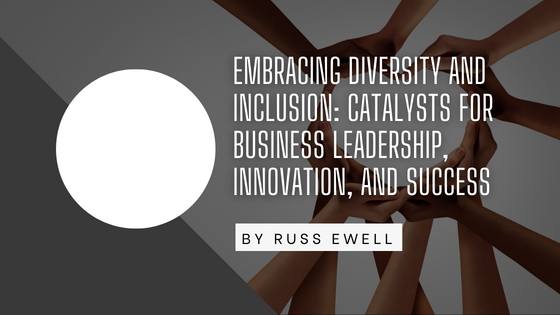In today’s rapidly evolving global landscape, businesses are recognizing the profound impact of diversity and inclusion in driving innovation and fostering success. Gone are the days when leadership was synonymous with a homogeneous group of individuals. Instead, embracing diversity and inclusion has become crucial for businesses that are focused on thriving in a dynamic marketplace.
Diversity encompasses differences in race, ethnicity, gender, age, sexual orientation, socioeconomic background, physical abilities, and more. Inclusion, on the other hand, is about creating an environment where every individual feels respected and empowered to contribute their specific perspectives and talents. Together, diversity and inclusion foster a culture of creativity, collaboration, and empathy, essential ingredients for driving innovation and achieving business goals.
One of the key ways diversity and inclusion contribute to business success is by bringing a wide range of perspectives to the table. When teams are composed of individuals from a variety of diverse backgrounds and experiences, they naturally approach problems from various angles, leading to more innovative solutions. Multiple studies have found that diverse teams outperform ones in terms of creativity, problem-solving, and decision-making.
Moreover, diversity and inclusion are crucial for understanding and catering to diverse customer bases. In a globalized world where markets are increasingly diverse, businesses must be able to connect with customers from different cultural backgrounds. Having a diverse workforce can provide valuable insights into these diverse markets, enabling companies to tailor their products and services effectively.
Furthermore, fostering diversity and inclusion can enhance employee engagement and retention. When employees feel valued and respected, they are more likely to be motivated, loyal, and committed to their organization’s goals. This, in turn, reduces turnover rates and the costs that come with recruiting and training new employees.
Businesses that prioritize diversity and inclusion also tend to attract top talent. With how competitive the job market is, many candidates actively seek out employers who demonstrate a commitment to diversity and inclusion. By promoting a diverse and inclusive workplace, businesses can differentiate themselves and attract a more diverse pool of candidates, including those with unique skills and perspectives that can drive innovation.
However, achieving diversity and inclusion in business leadership requires more than just saying it out loud. It requires a concerted effort to dismantle systemic barriers, address unconscious biases, and foster an inclusive culture at all levels of the organization. This may involve implementing diversity training programs, establishing mentorship and sponsorship initiatives for underrepresented groups, and ensuring equitable hiring and promotion practices.
Diversity and inclusion are essential drivers of innovation and success in business leadership. Embracing diversity and fostering an inclusive culture not only leads to better decision-making and problem-solving but also enhances employee engagement, retention, and talent acquisition. By prioritizing diversity and inclusion, businesses can position themselves for long-term success in a world that is more focused on diversity.
